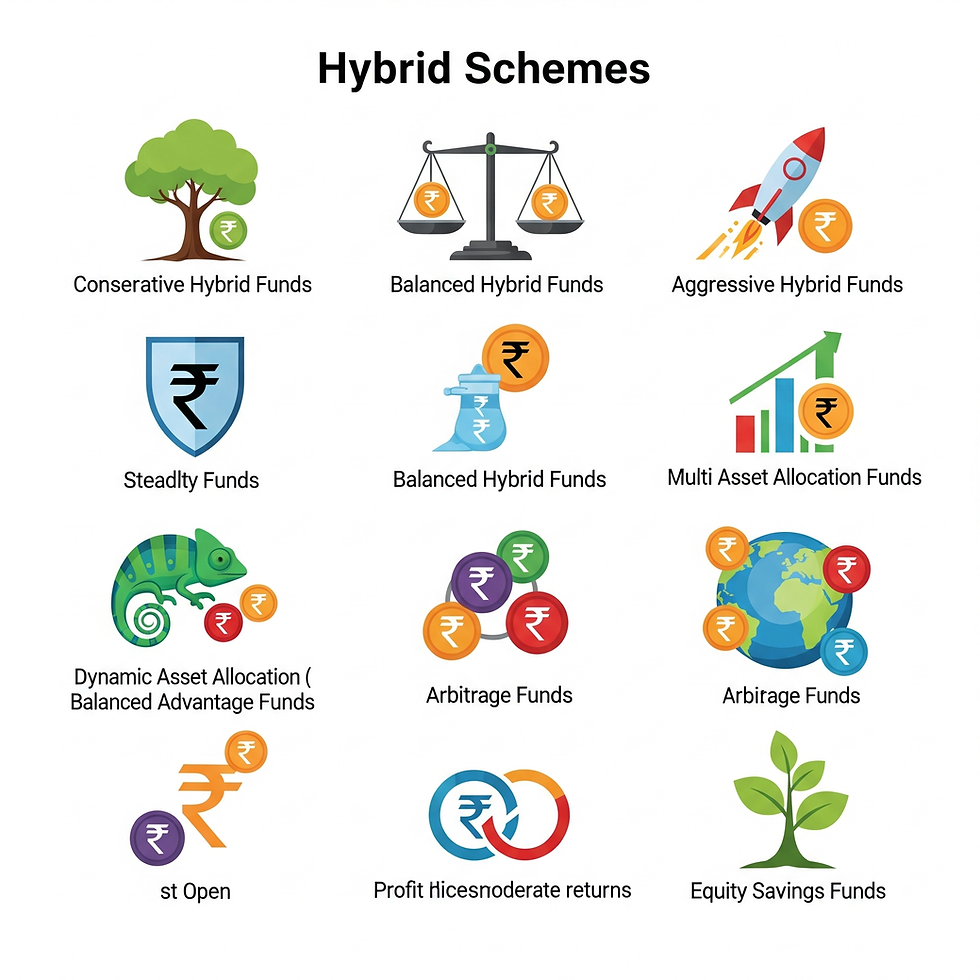What Are Thematic Funds?
- M Manohar Rao
- Jan 6, 2025
- 5 min read

Tags: Wealth Management, Investment Lesson, Mutual Funds, Stock market, Budget, Finance, Investing, Personal Finance, Investment
Article Summary
Thematic funds invest in stocks based on a particular theme, strategy or approach, to deliver returns that are generally higher than diversified equity funds.
Existing equity investors with a high risk appetite may consider limited investments in them to boost overall returns.
Before investing, it’s essential to consider factors like the theme’s long term potential, risk, scheme’s objective, past performance, expenses, and tax treatment.
Investors with an existing equity portfolio may often look for new investments to boost growth. Like protein supplements for fitness freaks trying to build muscle, investors wanting to add muscle to their money’s growth may consider thematic funds.
What are thematic funds?
These are equity funds that invest in stocks based on a particular theme, strategy, or approach with an aim to deliver higher returns than diversified equity funds. Investors have a wide range of thematic mutual funds to choose from. For instance, there are thematic funds that invest in companies related to a theme like MNCs, consumption, infrastructure or focusing on geo-graphical regions like East Asia or America, or existing or emerging trends like business cycles.
Many thematic funds invest across numerous categories. For instance, ESG funds (Environment, Social and Governance) invest in companies with environmentally sustainable, socially responsible, and ethical practices.
Having dwelt with the question “What are thematic funds?”, before discussing key aspects of investments in thematic mutual funds, we need to briefly touch upon another category of equity funds, i.e. sector funds. They somewhat resemble thematic funds. However, it is essential for investors to understand the difference between the two categories to get a better sense of thematic funds meaning.
Difference between sectoral and thematic funds
Sectoral funds invest in companies with similar businesses, products or services. They help investors identify growth opportunities in a specific sector like banking, healthcare, transportation, etc. and is generally less diversified to thematic equity funds. Thematic funds are typically more diversified than sector funds as they invest in a theme which may include various sectors associated with that theme. Thus, one may expect slightly lower volatility in thematic funds compared to sector funds.
Important Roles Thematic Funds Can Play
There are two major roles thematic funds can play in your mutual fund and overall investment portfolio.
Potential for high returns Thematic funds focus on investment ideas and can deliver higher returns associated with the growth of the theme and therefore, they have the potential to provide the growth boost many nuanced investors seek.
Diversification When investors buy thematic funds with broad themes that make investments across sectors and market capitalisations, they also bring in the element of diversification which can be complimentary to the investor’s existing portfolio.
What to Consider When Investing in Thematic Funds
As investors seeking higher growth scout for the right thematic fund, they need to consider the following aspects to make the right choice.
Uniqueness and growth potential Assess whether the thematic fund has long term growth potential and can make a fundamentally new contribution to your portfolio.
However, since these funds invest in one theme, hence they endure higher risk as well. Therefore, investors should look at adding thematic funds to the “Satellite” portion of the portfolio. This constitutes a small portion of investments, typically tries to exploit emerging and high risk opportunities.
Long term themes Typically, most rewarding themes based on long term trends, transitions and shifts in businesses and societies.
Scheme details Like other mutual fund investments, you need to grasp essential scheme details like objective and underlying securities.
Risks Determine whether you are comfortable with the thematic fund’s risks as indicated in the scheme Risk-O-Meter and in the scheme documents.
Fit with financial goals As every investment needs to be earmarked to a financial goal, with a thematic fund too, one needs to identify the specific role it will play in fulfilling financial goals.
Performance track record For existing thematic funds, you need to compare past performance with scheme benchmarks and peers over one, three and five years and also evaluate the growth potential in the theme.
Check fund expenses Ensure that the fund expenses are not too high to make a significant dent on your returns.
Tax impact They are treated as equity-oriented funds for taxation. If you redeem your investment within a year, you pay tax on short term capital gains and if sell after a year, it falls under long term capital gains and taxed at 10% above Rs. 1 lakh of capital gains.
When To Buy Thematic Funds and Who Should Buy Them
While investors can get attracted by the high growth potential of thematic funds, it is important to know whether these funds suit their financial goals. Here are some pointers that can help investors make informed decisions.
Investors with existing portfolios As we have mentioned, thematic funds work best for investors with existing portfolios of investments, seeking higher growth.
High risk appetite Thematic Funds are typically very high risk equity funds and thus are suitable for only those investors who have a high risk appetite. Potential higher rewards come with higher risks too.
Investor ability to identify rewarding themes Well-informed investors are typically in a better position to benefit from thematic funds since investors need to identify themes that will be rewarding in the future. Of course, investors may seek advice and guidance from qualified and established financial advisors.
Long term horizon Like other equity funds, such as diversified equity funds, thematic funds work well for longer term goals that are at least 3 years or more away.
To conclude, thematic funds can help take the overall growth of your portfolio to a higher gear. However, investors need to recognise that they come with substantially higher risks. The key to getting the best out of thematic mutual funds lies in understanding factors such as your capacity to bear very high risk, long term financial goals where they can be useful, besides identifying themes likely to be rewarding in the long term.
Thematic Funds Investment Checklist
Check for uniqueness and long term growth potential of the theme.
Examine scheme details, especially risks, and alignment with financial goals.
Assess performance track record over different periods in comparison to benchmarks and peers.
Check for any significant impact of fund expenses on returns.
Establish tax impact since capital gains are subject to tax.
Who Should Invest In Thematic Funds?
Existing equity investors seeking to boost growth
Investors with an appetite for very high risk investments
Knowledgeable investors who can identify themes rewarding in the long term by themselves or with help from qualified financial advisors
Investors seeking high returns in the long term for needs in the distant future
FAQs
What is the difference between Thematic Funds and Sectoral Funds?
Sectoral funds are equity funds that invest in companies with similar businesses, products, or services to generate high growth. Thematic funds are typically more diversified than sector funds and typically invest across sectors associated with the theme and hence across categories of stocks, businesses, and geographies. Thus, thematic funds tend to be relatively less volatile than sector funds.
How much investments should be made in Thematic Funds?
Being very high risk investments, many experts recommend that Thematic Fund investments should be restricted to 10% or less of the investment portfolio.
Disclaimer: The information set out above is included for general information purposes only and is not exhaustive and does not constitute legal or tax advice. All complaints regarding Mutual Fund can be directed towards visit www.scores.gov.in (SEBI SCORES portal). Readers are requested to make informed investment decisions and consult Chaitanya Financial Consultants – 9000628943 / mfd.mmr@gmail.com to determine the financial implications with respect to investing in Mutual Funds.
Mutual Fund investments are subject to market risks, read all scheme related documents carefully.



Comments